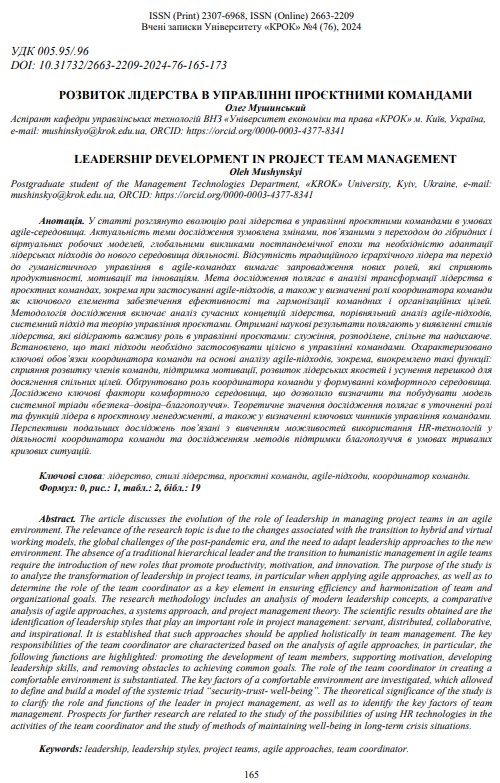LEADERSHIP DEVELOPMENT IN PROJECT TEAM MANAGEMENT
DOI:
https://doi.org/10.31732/2663-2209-2024-76-165-173Keywords:
leadership, leadership styles, project teams, agile approaches, team coordinatorAbstract
The article discusses the evolution of the role of leadership in managing project teams, in particular in the context of an agile environment. The relevance of the topic is driven by the transformation of the work environment, the growing popularity of hybrid working models, and the need to adapt leadership approaches to new conditions. The absence of a traditional hierarchical leader in agile teams requires the introduction of new roles that promote productivity, motivation and innovation. The purpose of the study is to define the functions of the project team coordinator as a key role that ensures the formation of a comfortable environment for the team. The research methodology includes an analysis of modern leadership concepts, a comparative analysis of agile approaches, a systems approach, and project management theory. The scientific results obtained are the identification of leadership styles: service, distributed, collaborative and inspirational, which are used holistically in team management; the key functions of the team coordinator are identified based on the analysis of agile approaches; a model for creating a comfortable work environment is formed, described by the triad ‘safety-trust- well-being. The theoretical significance of the study is to clarify the role and functions of leadership in project management and to identify the key factors of team management. Prospects for further research are to explore the possibilities of using HR technologies in the activities of a team coordinator and to investigate methods of maintaining well-being in long-term crisis situations.
Downloads
References
Бушуєв , С., Сукач , С., & Бушуєва , В. (2022). Надихаючий менеджмент інноваційних проєктів. Управління розвитком складних систем, (51), 12–19. https://doi.org/10.32347/2412-9933.2022.51.12-19
Byrne, A., & Barling, J. (2015). Leadership and project teams. In Oxford University Press eBooks (pp. 137–163). https://doi.org/10.1093/acprof:oso/9780199861378.003.0006
Фролов, І., & Колодінська, Я. (2023). Вплив лідерського стилю на динаміку та продуктивність команди інноваційних підприємств. Науковий вісник: Збірник наукових праць Європейського університету. https://doi.org/10.36919/978-966-301-265-0/1.2023.138
Hofmann, D. C. (2023). Charismatic leadership. In Springer eBooks (pp. 326–329). https://doi.org/10.1007/978-3-030-22767-8_23
House, R.J. (1996). Path-Goal Theory of Leadership: Lessons, Legacy, and a Reformulated Theory. The Leadership Quarterly, 7, 323-352. http://dx.doi.org/10.1016/S1048-9843(96)90024-7
Imam, H., & Zaheer, M. K. (2021). Shared leadership and project success: The roles of knowledge sharing, cohesion and trust in the team. International Journal of Project Management, 39(5), 463–473. https://doi.org/10.1016/j.ijproman.2021.02.006
Kopchak, Y., Matveyev, M., & Motorniuk, U. (2024). Features of the influence of different leadership styles on enterprise management. Scientific Notes of Taurida National V.I. Vernadsky University. Series: Economy and Management, 74(2). https://doi.org/10.32782/2523-4803/74-2-7
Lee, M. Y., & Edmondson, A. C. (2017). Self-managing organizations: Exploring the limits of less-hierarchical organizing. Research in Organizational Behavior, 37, 35–58. https://doi.org/10.1016/j.riob.2017.10.002
Liashenko, O. (2023). Security thinking: the ukrainian context. Economics, Finance and Management Review, (2), 137–146. https://doi.org/10.36690/2674-5208-2023-2-137-146
Маматова, Т. В. (2021). Довіра як ключова цінність проєктного і програмного управління в публічній сфері. Дніпровський Науковий Часопис Публічного Управління Психології Права, 4, 5–10. https://doi.org/10.51547/ppp.dp.ua/2021.4.1
Microsoft WTI (2022). Great Expectations: Making Hybrid WorkWork. Microsoft WorkLab: Work Trend Index 2022.
Morgeson, F. P., DeRue, D. S., & Karam, E. P. (2009). Leadership in Teams: A functional approach to understanding leadership structures and processes. Journal of Management, 36(1), 5–39. https://doi.org/10.1177/0149206309347376
Олійник, І. (2024). Вплив ефективного лідерства на формування корпоративної культури. Таврійський науковий вісник. Серія: Економіка, (19), 241-248. https://doi.org/10.32782/2708-0366/2024.19.29
Рач, В.А. (2013). “Небезпека/ризик/криза” як триєдина сутність процесів розвитку в сучасній економіці. Управління проектами та розвиток виробництва. Луганськ: Вид-во Східноукраїнський нац. ун-т ім. В. Даля. No1(45), с. 155–160.
Rogers, C.R. (1961). On Becoming a Person: A Therapist’s View of Psychotherapy. Houghton Mifflin, Boston.
Spillane, J. P. (2005). Distributed Leadership. The Educational Forum, 69(2), 143–150. https://doi.org/10.1080/00131720508984678
Томах, В., Дорошенко, Т., & Тимошенко, Ю. (2024). Стилі лідерства та їх вплив на управління підприємством. Економіка та суспільство, (60). https://doi.org/10.32782/2524-0072/2024-60-149
Цихетнер-Хіртенлінер, Д. (2023). Формування стилю лідерства в процесі зміни поколінь в управлінні підприємством. (PhD дисертація) Харківський національний економічний університет імені Семена Кузнеця. https://www.hneu.edu.ua/wp-content/uploads/2023/11/Zehetner-Hirtenlehner_Daniela-Dysertatsiya-Vchena-rada-DF-64.055.035-2023.pdf
Zehetner-Hirtenlehner, D. (2023). Formation of leadership style of Generation Z. Actual Problems of Innovative Economy and Law, 8(2–3), 79–84. https://doi.org/10.36887/2524-0455-2023-3-12

Downloads
Published
How to Cite
Issue
Section
License

This work is licensed under a Creative Commons Attribution-NonCommercial 4.0 International License.

